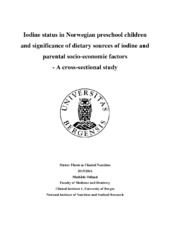Iodine status in Norwegian preschool children and significance of dietary sources of iodine and parental socio-economic factors - A cross-sectional study
Master thesis

Åpne
Permanent lenke
https://hdl.handle.net/1956/13027Utgivelsesdato
2016-05-15Metadata
Vis full innførselSamlinger
Sammendrag
Iodine is an essential trace element with important physiological effects in the human body. Iodine is necessary for thyroid hormone synthesis. The hormones are needed for tissue development in the central nervous system, growth and brain development in children, and regulation of basal metabolic rate and macronutrient metabolism. Iodine deficiency is still a global threat despite international efforts to eliminate the condition. In recent years, major progress have been made towards elimination of iodine deficiency due to introduction of universal salt iodization programs. However, iodine deficiency is still the number one cause of preventable mental retardation in children. In Norway, goiter prevalence was high prior to introduction of fortification of cow fodder in 1950. Since then, iodine status of the Norwegian population have gradually improved. However, several studies have suggested that subgroups of the Norwegian population may be susceptible to iodine deficiency due to low intake of iodine-rich food sources including seafood and dairy products. Studies on iodine status in Norwegian preschool children (aged 4-6 years) are old and lacking. Study aims: Main aim of the present thesis was to determine and evaluate the iodine status of preschool children living in Bergen. Specific aims included investigations of possible associations between urinary iodine concentration and iodine-rich food sources and parental socio-economic factors. Associations between parental socio-economic factors and the children's intake of iodine-containing foods were also examined. Methods and materials: The present thesis is part of a larger intervention study. Habitual dietary intake was assessed by a semi-quantitative food frequency questionnaire. Iodine concentration was determined by inductively coupled plasma-mass spectrometry in non-fasting, spot urine samples. Results: Approximately 50% of the children consumed fish and other seafood less frequently than current Norwegian recommendations of two to three servings per week. Nearly all children consumed dairy products daily. The iodine status of the preschool children was adequate (133 µg/L). Intake of fatty fish (OR = 1.95, 95% CI = 1.01-3.77, p = 0.048) and sweet milk (OR = 2.17, 95% CI = 1.07-4.38, p = 0.031) were associated with sufficient iodine status. Weak correlations were observed between iodine status and intake of iodine-rich food sources and between iodine status and parental socio-economic factors. In addition, unadjusted logistic regression models found higher socio-economic status to be associated with increased likelihood of a higher intake of seafood for dinner and dairy products among the children. Conclusions: The preschool children in this study had adequate iodine status, and intake of sweet milk and fatty fish were significant predictors of sufficient iodine status. Parental socio-economic status seemed to be associated with the children's intake of seafood and dairy products.